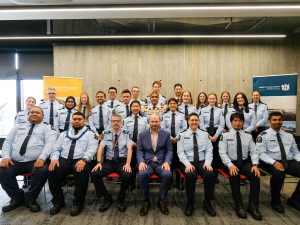NZ winegrowers advance vineyard biosecurity in 2025
The year was marked by “progress, collaboration and reflection” in biosecurity, says New Zealand Winegrowers Biosecurity Advisor Jim Herdman.
 Biosecurity New Zealand’s newest quarantine officers, who graduated in Auckland today, pictured with Biosecurity New Zealand northern regional commissioner Mike Inglis (third from left bottom row), Biosecurity New Zealand deputy director-general Stuart Anderson (centre bottom row), and Biosecurity New Zealand chief quarantine officer Stephen Clement (second from left back row).
Biosecurity New Zealand’s newest quarantine officers, who graduated in Auckland today, pictured with Biosecurity New Zealand northern regional commissioner Mike Inglis (third from left bottom row), Biosecurity New Zealand deputy director-general Stuart Anderson (centre bottom row), and Biosecurity New Zealand chief quarantine officer Stephen Clement (second from left back row).
Biosecurity New Zealand has welcomed 23 new quarantine officers and four new detector dog handlers this month.
They say this will bolster New Zealand’s frontline protection against pests and diseases in time for the pre-Christmas mail rush and peak international visitor season.
Biosecurity New Zealand northern regional commissioner Michael Inglis says the quarantine officers graduated in Auckland last week after completing a 12-week training programme.
“The training gives the officers a comprehensive understanding of the threats to our environment and primary industries, and the skills they need to inspect and make biosecurity clearance decisions about good accompanying travellers to New Zealand,” says Inglis.
“The new recruits are introduced to the role that quarantine offices play as guardians for our way of life,” he says.
All of the new quarantine officers will be deployed at Auckland International Airport.
To bolster ranks across the country, an additional 19 officers – eight in Christchurch, seven in Wellington, and four in Queenstown – will graduate early next month.
The new detector dog handlers will join Biosecurity New Zealand’s border team this week, after graduating from their own 12-week training programme.
The trainees have been learning together how to manage the demands of detection in busy international airports and mail centres.
Two of the handlers will start work in Auckland, either at the airport or International Mail Centre. The remaining two will be deployed at Wellington and Christchurch airports.
“The new officers and handlers will play a critical part in protecting our economy and precious natural environment from potential harmful pests and diseases,” says Inglis.
This summer, a key focus for Biosecurity New Zealand’s frontline staff is keeping out pests and diseases that could have a devastating impact on our economy and environment – things like exotic fruit flies and brown marmorated stink bug (BMSB).
“These potential intruders are especially active in summer and pose a direct threat to our hard-working growers and farmers, who underpin rural communities and our economic wellbeing,” Inglis says.
“We urge all travellers entering the country to be vigilant and follow all biosecurity instructions carefully.”
Tickets are now available for Beef + Lamb New Zealand’s (B+LNZ) Out the Gate, returning from 19-21 May 2026 at Te Pae, Christchurch.
Dairy Women's Network (DWN) is welcoming AgriHealth as a new partner.
Northland Field Days patron Ross Newlove remembers the inaugural field days he attended 40 years ago.
Southland farmer Murray Donald has been appointed as chair of Safer Farms, the industry-led organisation focused on reducing harm, injuries and fatalities in the agricultural sector.
National Lamb Day returns this Sunday, 15 February, with Beef + Lamb New Zealand Inc calling on Kiwis to fire up their barbecues and celebrate the people and the product that put New Zealand on the world map.
When it comes to arranging the sound system at Northland Field Days, no one does it better than Colin Finlayson.

OPINION: Here w go: the election date is set for November 7 and the politicians are out of the gate…
OPINION: ECan data was released a few days ago showing Canterbury farmers have made “giant strides on environmental performance”.